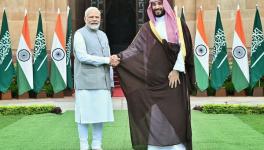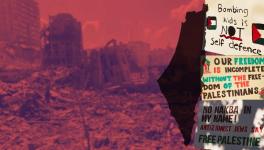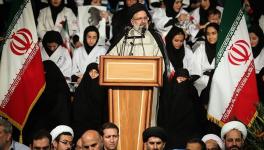The Left and the People: Extending Hamid Dabashi's Critique
“The overall anti-imperialist sentiment remains strong among the Syrian population and the attempts by parts of the Left to smear the entire uprising as a stand-in for imperialism belies a Manichean worldview that badly misunderstands the country’s history.
I don’t see any contradiction in opposing intervention and simultaneously being against the Assad regime—which, we need to remember, has embraced neoliberalism and consistently used a rhetoric of ‘anti-imperialism’ to obfuscate a practice of accommodation with both the US and Israel.” Adam Hanieh, author, Capital and Class in the Gulf Arab States, 2011.
One of Hamid Dabashi’s most acidic critiques of Azar Nafisi’s Reading Lolita in Tehran is that she indulged in the “systematic denigration of an entire culture of revolutionary resistance.” A simple index for the Left is to protect itself from this kind of amnesia. The Syrian people threw off the violent regime of imperial France in their Great Revolt from 1925 to 1927. The revolt inaugurated a trek into Arab nationalism, whose most eloquent energies were absorbed and distorted by the Ba’athist party that has ruled Syria since 1963. Nonetheless the Syrian people incubate a thirst for freedom from their suffocation by the Ba’ath regime. The problem has been that the power of the Syrian state and the enchained geopolitics of the region have denied them, for now.
In his recent piece for Al Jazeera, Dabashi makes several important points, driving home what should be by now a Leftist consensus concerning the ensemble of the Right – the United States, Europe, Gulf Arab states and Israel. Dabashi suggests that this Right is eager to poke its fingers into a rebellion only if it is able to fumigate all the independent rebellious elements and produce a new regime in its image. But then Dabashi pivots and turns his eye to the Left. His accusation here is that both the Right and the Left are “statists,” interested only in who is able to take “control of the state apparatus, of state power, of steering (or more accurately trying to steer) the falling regimes of power to their own direction.”
The problem here is not whether Dabashi is right or wrong. The problem is in the generality of his exposition. I agree with him that the “Right” is an entity. What divides it is not essential from the standpoint of the Left. There are certainly non-interventionist “America First” types (such as Pat Buchanan) who would not line up neatly next to hyper-interventionists such as US Ambassador to the United Nations Susan Rice. Given the balance of forces within the Right, however, Buchanan barely makes a blip on the radar screen of power. The Rightist consensus is for what they like to call a “muscular” foreign policy.
The Left, which is infinitely weaker, is therefore unable to forge such an easy consensus. The diversity in the Left is far more important because, at present, no current has a hold on the discourse of the Left. If one were to ask of a self-professed Leftist, “what is your position on Syria?,” there would be no adequate response. Leftist diversity is important to take into consideration because it would allow us to have a serious discussion about where we stand and where we ought to go.
The Currents of the Left
Dabashi does not specify whether his Left is in Syria or outside or whether it is part of the Syrian diaspora or not. This is relevant given the difference between the character of the debate outside and inside the Syrian Left. The latter’s principle purpose is to settle accounts with the Ba’ath regime and to move the revolution in the people’s favor. Whereas, the character of the debate outside the Syrian Left must aim, among other things, to lift the boot of imperialist suffocation off the necks of the Syrian people and to prevent an imperialist intervention that makes the task of the Syrian Left even harder.
Regarding Syria, the first divide in the Left is in the characterization of the Ba’ath regime. One section, a very small one, takes the view that the Ba’ath regime led by Bashar al-Assad is a revolutionary regime, whose politics is made visible through its position vis-à-vis Israel (anti) and Iran (pro). In this camp (inside Syria) lies the exhausted Syrian Communist Party and (outside Syria) sits the website Global Research. Both the SCP and Global Research take their anti-imperialism into territory that occludes the authoritarianism of imperialism’s adversaries -- a classic case of my enemy’s enemy is my friend.
Only the most inhumane among us would not see the bombardment of Homs as unconscionable. Those who say this is a Civil War and try to defend the attack on the city forget that even if this were a Civil War and if the regime were actually progressive, it should not bomb civilian neighborhoods in such an indiscriminate manner. The habit of the Ba’ath is to raze cities and call it national integration (this is what al-Assad Senior did in Hama in 1982). No Leftist can be cavalier about Homs.
Much of the Left recognizes that the Ba’ath regime is neither anti-imperialist nor anti-capitalist. It recognizes that al-Assad’s government has most often played the border guard for Israel, and undoubtedly evokes no revolutionary good feelings amongst the Palestinians in either Lebanon or the West Bank (perhaps a small current in Gaza, until Hamas’ Ismail Haniya threw his support with the Syrian people against the al-Assad regime). Among the Palestinian Left the fundamental break with Syria took place during its betrayal of their cause in its invasion of Lebanon in 1975. Most of the Left is also aware that the Ba’ath Party was the enemy of both Nasserism (which banned the Ba’ath during the union of Syria and Egypt between 1958 and 1961) and the original Syrian Communist Party (when it was in its heyday before the military coup in 1961). During its peak, the SCP did impressively well in the 1954 elections, scaring a British intelligence official who moaned, “The increase in communism in Syria during 1954, taken in conjuncture with the general trend to the left and the government’s reluctance to take any really effective measures against it, is an unfortunate development.” In 1944, the Ba’ath’s intellectual godfathers Michel ‘Aflaq and Salah al-Din al-Bitar declared, “Communism is alien and foreign to everything Arab.” It was the ideological anvil on which the Ba’ath smashed the SCP into mute submission. And it has been the Ba’ath polices over the past twenty-five years that have created a neo-liberal elite in Syria’s cities, encaging the population in what Bassam Haddad calls the “political economy of authoritarian resilience.”
If the bulk of the Left is sympathetic to an undoing of the Ba’ath regime in Syria, there is yet no consensus on strategy. Most of us in the Atlantic Left are, of course, not directly involved in the Syrian opposition’s active and vibrant debates, which seek to find a way forward. Here there is a prior question to be asked: could we even characterize the Syrian opposition as being of the Left? The venerable Leftist Michel Kilo recently said that he neither represents the new movement nor is he able to offer much to it.
The steadfastness of this new movement and the resistance to the Ba’ath regime has taken the older Syrian Left by surprise. Among the older Leftists the struggle has opened up a period of reflection on the long-term implications of this opening. There are a group of intellectuals who traverse what might loosely be called the Left and the Liberal Left. This includes people like Kilo certainly in addition to the journalist Fayez Sara, the official spokesperson for the National Coordination Body for Democratic Change Hussein al-Awdat, as well as the old Communists now reform liberals Riad al-Turk and Hassan Abdel Azim. There is also a Syrian Leftist revolutionary current, but it is largely outside the country and lacks a mass base.
Some of them are in leadership positions for a movement that is askance from them, with its own tempo and its own energy. What is the character of this movement on the ground? What are its debates? Has it a position for the future beyond the horizon of the departure of al-Assad? What is its social vision toward the diverse matrix of Syria? These are the kinds of questions that require further investigation. However, these are often the kinds of questions that are put into amber during an armed struggle, unless the armed struggle (like the Algerian National Liberation Front) emerged out of a protracted ideological and political process. Syria, with its Romania-like asphyxiation of the Ba’ath, perforce had a different trajectory to insurrection than Algeria.
Leftists who are outside the confines of Syria must give their full and active solidarity to the Syrian people, particularly to the Syrian New Left in formation. Class-consciousness is not a thing that emerges fully formed and in perfect condition. It emerges in struggle, filled with errors and dangers, wearing the clothes it finds, learning to walk before it can run. What those who are outside have to support is not this or that tendency but the integrity of the full Syrian Left as it engages in a complex discussion about the most effective strategy forward in a time of war.
Intervention
The debate in the Left outside the immediate Syrian Left should not be “military intervention vs. no military intervention.” That is a debate framed by the Right, to which the Left in the Atlantic world too often succumbs. Such a debate treats as neutral the barbarism of North Atlantic Treaty Organization (NATO) in places such as Iraq and Libya. Additionally, it suggests that cruise missiles can simplify the contradictions on the ground in places such as Syria. That human rights activists in Syria -- such as Haytham al-Maleh,who is also close to the Muslim Brotherhood -- favor bombardment of Syria says more about the demoralization of Syrians in the face of forty years of dictatorship and brutality than necessarily about the most effective way to both begin to uproot the Ba’ath regime by maintaining the integrity and nascent dreams of the Syrian people.
It is here that a valid political intercession should be welcomed. It is time to assess the character of the forces arrayed against the Syrian people, and whether hope for an external intervention is either realistic or to be sought. On the one hand, Asharq Al-Awsat quotes an unnamed US military official that the US plans for an aerial blockade of northern Syria. On the other hand, when asked about a NATO role in Syria, its chief Anders Fogh Rasmussen said, “I don’t envision such a role for the alliance.” The Atlantic powers ramp up their rhetoric at the same time as they keep their swords sheathed. To talk about the geopolitics that surrounds Syria (the Russian and Chinese UN veto) and the cynicism of Israel and the United States (who are not keen on the departure of the Ba’ath regime) is not to deny the aspirations of the people. Such talk is about warning them not to develop a strategy that will require a no-fly zone and NATO cruise missiles. Saudi and Qatari Special Forces will not be sufficient to take on the Syrian army, unless it cracks open and releases defectors by the hundreds each day.
If no external military intervention is either forthcoming or to be welcomed, the question for the outside Left is how best to build pressure for a drawdown from the bloodletting that threatens to leave Syria anemic. Is there an effective strategy toward a ceasefire? Should the Left in Russia build pressure on the Putin regime to push the al-Assad government toward a cessation of hostilities in Homs (a cessation is not just a ceasefire, since it means that the troops must withdraw from the city)? Should the Left in the United States and in the other NATO countries build pressure for a less maximalist position in Syria (al-Assad must go)? Such maximalism falsely emboldens the rebellion, whose members believe that this means that the Cruise Missiles are on the way. It also hardens the obduracy of the al-Assad regime, which has everything to lose by stopping its assaults? Has the rebellion already weakened the legitimacy of the Ba’ath regime sufficiently that it has had to make promises that it was unwilling to make previously? It moved its goal posts from an abstract promise of “reform” to “no Ba’ath monopoly on state power” at some future date. If this is so, could a popular momentum build up toward an expedited transfer of power and the establishment of a provisional unity government that is under popular pressure to hold a truly democratic constitutional referendum? The “referendum” held on February 26 in the midst of the violence is not serious. Even the Russian Ambassador to the UN Vitaly Churkin said that in the absence of peace, constitutional reform is a “theoretical conversation.”
In the short term, shouldn’t the Left outside Syria raise the banner of a humanitarian corridor run by the UN and other humanitarian agencies to lift the siege of Homs?
Organs of Class Rule
Is the Left as narrowly focused on the capture of state power as Dabashi claims? I am not sure. I think the Left is trying to make sense of the Arab Spring, its diversity, its promise, and its perils (on that score, both Dabashi and I have books soon to appear on the Arab Spring). The Left groups inside the nations of the Arab world are trying to navigate a new terrain where the popular forces have energy but the institutional and ideological space is occupied by clericalism of one kind or another. The Left outside has to commit itself to fight against imperialism’s habits, as the United States and its North Atlantic allies try to re-erect their four pillars: oil, Israel, stable allies (i. e. the Gulf Arab monarchies) and the encirclement of Iran. We have to be vigilant on two fronts: (1) to not let our anti-imperialism lead to the defense of authoritarian regimes in the region and (2) to not let our enthusiasm for rebellion lead to cheering on the cruise missiles from US warships. These two sirens should worry us as we make our hesitant way alongside the rebirth of a
New Left in the Arab world.
No Left can duck the question of the immediate-term and the long-term. The questions above are largely short-term, but they do not exhaust our imagination. There is no question that in our period the state form has not yet been superseded. Indeed, the capture of state power remains firmly on the table. The state is thus far a central accumulator of social wealth and its main conduit for distribution. To remove the Left from the debate around control of the state allows the Right to take charge of the state form to its advantage. The case from Iran is apposite: the broad, popular Iranian Revolution of 1979 was seized by the clerics and their allies to forge the Islamic Republic. Other options were on the table. Concern for state power does not mean of course that the Left has to allow the contest over the state to be the main axis of its maneuvers. The promise of the Left is to both seize the state for the immediate betterment of life, and to open up a process to reconfigure society beyond the capitalist state form. Ours is a dual mission, with one eye on the present and another on the future.
Get the latest reports & analysis with people's perspective on Protests, movements & deep analytical videos, discussions of the current affairs in your Telegram app. Subscribe to NewsClick's Telegram channel & get Real-Time updates on stories, as they get published on our website.























